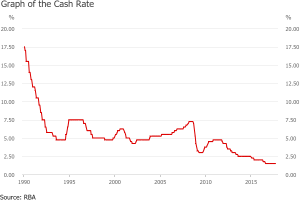Investors who want a secure place to keep their money without any market risks are faced with meagre choices. The cash rate is only 1.5%, and term deposit rates are around 2.5% for most terms, which is barely higher than inflation.

Yet term deposits and cash accounts are the mainstay of most personal investment portfolios, including about 30% of the assets of self managed super funds. With such low rates, investors need to rethink their term deposit rollover strategies and not simply accept the poor rates offered by their bank at maturity time.
The power of ‘retail inertia’
Back in the good old days, before political correctness, banks used to describe the willingness of customers to accept poor term deposit rollover rates as ‘retail inertia’. This means that banks might have a term deposit special at 3% and rollover similar deposits at 2%. The vast majority of existing customers accepted the lower rate.
Check what it says on a typical term deposit rollover letter: “If you have a special rate, that rate will generally apply for a single term. Standard term deposit rates may apply for subsequent terms.”
Which is bankspeak for: “You’ll receive a lower standard rate on rollover unless you ask for a special one.”
Banks also offer special bonus rates for the first four months on some at-call deposits. At the end of the four months, customers fall to the ‘standard’ rate, and most don’t leave.
A 0.3% bonus for four months is equal to only 0.1% per annum, an immaterial cost to the bank for gathering genuine retail deposits. It’s the same with credit cards and the ‘six months interest free’ for switching banks. They hope customers can’t be bothered changing again.
Don’t ignore the bank rollover letter
The term deposit rollover letter is not like the gas or electricity bill where the customer must accept the cost. There are many ways an investor can improve the outcome:
1. Critically review the rollover rate. Most depositors tick ‘rollover for the same term on maturity’ when they open a term deposit, and if no action is taken, the rate offered by the bank will be locked in. Most banks give a one-week grace period if the rollover date is missed.
2. Phone your bank and ask for a higher rate. First, go to a comparison website such as ratecity.com.au or mozo.com.au, and arm yourself with the highest rate. Deposits of less than $250,000 with any ‘Authorised Deposit-taking Institution’ (ADI) are guaranteed by the Government.
Even if the bank is not prepared to match the offer from a small credit union, the bank will probably offer more than in the rollover letter.
3. Watch changes in terms and conditions. In the past, banks allowed early access to term deposits but they have become much stricter and usually impose penalties for early withdrawal. In some cases, banks have written to customers saying funds cannot be accessed (even with a penalty) inside a 31-day notice period.
4. Consider another term, although accepting higher rates for longer terms carries risks of being locked in for longer. A five-year rate at only 3% might be too much exposure to rising rates.
5. Don’t leave the paperwork until the last minute. Although banks usually nominate a grace period to negotiate a rollover, some require attendance at a branch to verify a variation.
In today’s online and mobile world of banking, it can be frustrating finding a branch just to sign a form. Also, the interest rate paid during the grace period is nominal, 0.5% to 1%, so act early.
6. Review the range of alternatives. Where term deposits once offered decent rates, now they give little more than capital security with the protection of the Government Guarantee for ADIs.
It’s worth checking alternatives such as bonds, bond funds, Exchange Traded Funds or listed securities, but they come with more risk and professional advice may be useful. All investment platforms have a range of bond funds and income-based options.
Whenever you see the words ‘Automatic Renewal’ on a term deposit rollover, there’s a strong chance you can do better.
Graham Hand is Managing Editor of Cuffelinks. This article is general information and does not address the circumstances of any individual.